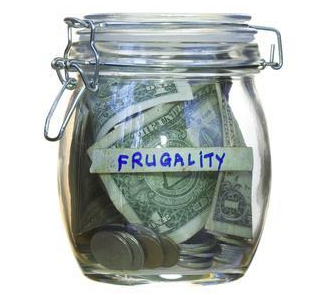 Do you love saving money?
Do you love saving money?
Are you looking for even more ways to keep more money in the bank?
Experian knows the importance of this for every person’s financial health.
So, as part of our overall commitment to financial literacy and in conjunction with our just released annual State of Credit report, we contacted some of our favorite personal finance writers and asked them to share one of their favorite ways to save money.
Check out these frugal-living tips:

Create a “wait and see” list. If you spot something you think you want to buy, write it down (in a physical notebook you carry with you, or as a note in your smartphone) or take a picture of it and store the picture in an app like Evernote. Then give yourself a “cooling off” period. Three days is good; three weeks may be better. Chances are pretty good that your passion for it will have cooled, and you’ll realize you can put the money to better use elsewhere.
Liz Weston, writes for MSN, and author of “There Are No Dumb Questions About Money.”
 One of my favorite tips is to run your financial life like you run your social life. Set-up calendar alerts for everything you need to do to keep your finances running smoothly, from paying your bills and your rent to checking your credit report once every four months. When it comes to bills, set a calendar alert for three days before the bills are the due, so you never make a late payment. And in January, set a calendar alert that reminds you to start preparing your taxes, so you’re not overly stressed when April comes around.
One of my favorite tips is to run your financial life like you run your social life. Set-up calendar alerts for everything you need to do to keep your finances running smoothly, from paying your bills and your rent to checking your credit report once every four months. When it comes to bills, set a calendar alert for three days before the bills are the due, so you never make a late payment. And in January, set a calendar alert that reminds you to start preparing your taxes, so you’re not overly stressed when April comes around.
Alexa von Tobel is the founder and CEO of LearnVest.com
 My favorite frugal tip is this: Keep track of your money before you spend it. I hesitate to use the word “budget” because it’s one of those words that makes people shut down, like “diet” or “colonoscopy.” In the popular imagination, “budget” connotes deprivation, sacrifice, pain.
My favorite frugal tip is this: Keep track of your money before you spend it. I hesitate to use the word “budget” because it’s one of those words that makes people shut down, like “diet” or “colonoscopy.” In the popular imagination, “budget” connotes deprivation, sacrifice, pain.
In fact, a budget is just a tool to make your money go where it will do the most good. That can mean rent, mortgage and retirement – but it might also mean “nice vacation paid for in cash.” You’re not hoarding every dime in case something awful happens, but rather directing your money so that something good will happen.
Some people call it a “spending plan” or a “spending intention statement.” Call it whatever you like. Just make the darned thing. I recommend Mint.com because I’ve heard so many positive reviews from users. (Color me old-school: I don’t use any apps or budgeting tools myself.)
Donna Freedman writes the Frugal Cool blog for MSN Money and is a staff writer at Get Rich Slowly. Her website is DonnaFreedman.com.
 The best way to save more money in your everyday life is to ask yourself one question each time you reach for your wallet to make a purchase: “Do I really need this?” If you can learn to differentiate between a “want” and a “need,” you should be able to cut a massive amount of spending. Do you need to buy a coffee and a candy bar from the convenience store? Do you have to to upgrade your cell phone and digital camera? Do you really need new clothes, and do you have to eat out at restaurants each week? Chances are, you can get by without spending money on these things. By getting into the habit of questioning the necessity of each purchase, you can certainly reduce your spending and build your savings.
The best way to save more money in your everyday life is to ask yourself one question each time you reach for your wallet to make a purchase: “Do I really need this?” If you can learn to differentiate between a “want” and a “need,” you should be able to cut a massive amount of spending. Do you need to buy a coffee and a candy bar from the convenience store? Do you have to to upgrade your cell phone and digital camera? Do you really need new clothes, and do you have to eat out at restaurants each week? Chances are, you can get by without spending money on these things. By getting into the habit of questioning the necessity of each purchase, you can certainly reduce your spending and build your savings.
Andrew Schrage is the Editor-in-Chief of MoneyCrashers.com, which has been featured in the Wall Street Journal, US News and World Report, Yahoo Finance, Forbes, and more.
 If you can’t see it and can’t touch it, you won’t spend it.
If you can’t see it and can’t touch it, you won’t spend it.
(This is why 401(k) plans work. The money is swiped out of your account before you ever see it, so you won’t spend it.)
Jean Chatzky is the financial editor for NBC’s TODAY show, is an award-winning personal finance journalist, AARP’s personal finance ambassador, and the host of “Money Matters with Jean Chatzky” on RLTV. You can reach her on Twitter @JeanChatzky and find more tips like this in her book: Money Rules The Simple Path to Lifelong Security.
 I consider myself a frugal guy (some might even call me cheap). But ironically, I’m not super disciplined when it comes to money. Srict budgeting never really worked for me. Too me, budgets feel like diets and are just really hard to stick to – and they often end in more frustration than results. My philosophy is that being successfully frugal shouldn’t require me to completely change my behavior. Instead, I find ways to create new, financially healthier habits that fit naturally into my life the way I actually live it already.
I consider myself a frugal guy (some might even call me cheap). But ironically, I’m not super disciplined when it comes to money. Srict budgeting never really worked for me. Too me, budgets feel like diets and are just really hard to stick to – and they often end in more frustration than results. My philosophy is that being successfully frugal shouldn’t require me to completely change my behavior. Instead, I find ways to create new, financially healthier habits that fit naturally into my life the way I actually live it already.
One trick I like to use is “minus one”. Every time I get in a checkout line, I stop, look at what I’m about to purchase, and remove one item. If you’re already a disciplined shopper and only buy things on your list, you probably don’t need this. But for the 99.9% of us who tend to leave stores with more than we came for, it’s an easy way to break the cycle of mindless impulse buying.
Phil Fremont-Smith is the co-founder and CEO of ImpulseSave.com
 I’m a sucker for a coupon code! It doesn’t matter if you are shopping online for a new shirt or to purchase Internet domain names, there’s probably a coupon code for you to get it for less. CouponCodes4You and RetailMeNot are good sites to check out. Or, if you are buying something online, Google the name of the item and “coupon code” and see if a coupon code pops up!
I’m a sucker for a coupon code! It doesn’t matter if you are shopping online for a new shirt or to purchase Internet domain names, there’s probably a coupon code for you to get it for less. CouponCodes4You and RetailMeNot are good sites to check out. Or, if you are buying something online, Google the name of the item and “coupon code” and see if a coupon code pops up!
Natalie P. McNeal, creator, TheFrugalista.com, author, The Frugalista Files: How One Woman Got Out of Debt Without Giving Up the Fabulous Life
 Focus on cutting expenses that you aren’t using, and finding discounts for what you do use. Many times there are monthly expenses in our budgets for things we just aren’t utilizing: memberships, monthly service fees, etc. Cut them out before you waste more money. If, however, an expense is justified, ask yourself if there is a way to reduce the expense through a discount, coupon, or simply by asking for a lower price.
Focus on cutting expenses that you aren’t using, and finding discounts for what you do use. Many times there are monthly expenses in our budgets for things we just aren’t utilizing: memberships, monthly service fees, etc. Cut them out before you waste more money. If, however, an expense is justified, ask yourself if there is a way to reduce the expense through a discount, coupon, or simply by asking for a lower price.
Philip Taylor is the blogger and founder behind PTmoney.com, and has been featured on CNBC, Fox Business, U.S. News and World Report, and MSN.
 Don’t give up. Saving, living frugally, and improving your relationship with money are all great goals — but they’re also big goals. And anytime you attack a big goal and have a setback, it can be easy to get frustrated, think you just can’t do it, and give up. But financial success isn’t achieved by just playing the short game — it’s a long-term plan.
Don’t give up. Saving, living frugally, and improving your relationship with money are all great goals — but they’re also big goals. And anytime you attack a big goal and have a setback, it can be easy to get frustrated, think you just can’t do it, and give up. But financial success isn’t achieved by just playing the short game — it’s a long-term plan.
Moreover, it’s important to remember that there are a lot of different ways to approach living frugally; just because a technique worked for other people, it doesn’t mean it’s going to work for you. So whenever you have a setback, a lapse, or a failure — learn from it, research other options, retool, and try again. If you don’t give up, eventually, you’ll get to where you want to be.
Meg Favreau is the Senior Editor at Wisebread.com and tweets @wisebreadmeg. She’s also a comedian, food enthusiast, and author of the book Little Old Lady Recipes.
 Learn how to cook. If you actually enjoy and look forward to the process–and the results–than it’s so much easier to avoid the temptation of take-out or expensive dinners out.
Learn how to cook. If you actually enjoy and look forward to the process–and the results–than it’s so much easier to avoid the temptation of take-out or expensive dinners out.
It’s also pretty easy to teach yourself, thanks to the Food Network, Allrecipes.com, and other food websites and blogs.
Kimberly Palmer is the Sr. Editor at U.S. News & World Report and author of GenerationEarn.com
 Cut back on eating out! Food cooked at home is so much cheaper and healthier. If you’re just getting started, keep things simple and start small.
Cut back on eating out! Food cooked at home is so much cheaper and healthier. If you’re just getting started, keep things simple and start small.
Try packing your lunch a few days a week, or making dinner a couple of nights per week. Over time, your skills will improve and you’ll be able to do more and more of your own cooking.
Kristen is the founder of TheFrugalGirl.com, where she shares practical tips for simple, frugal living. She tweets at @thefrugalgirl can also be found at facebook.com/thefrugalgirl.

I personally always bring my lunch to work.
I not only save a lot of money, I am not tempted to make unhealthy choices. Good for my waistline and my savings account.
Maxine Sweet is vice president of Experian North America’s Public Education organization and leads Experian’s consumer education, community involvement and corporate responsibility teams. Maxine is responsible for helping consumers understand credit reporting and use credit wisely.
 My favorite frugal tip is to calculate how much of your time something will cost before you buy it. I created a really simple calculator on Bargaineering.com that can take your annual salary, a price (whatever you’re buying), and calculates how many hours you’ll need to work to help pay for it. I’ve found that thinking about purchases in terms of how many hours you need to work to pay for it is far more enlightening than looking at that dollar value.
My favorite frugal tip is to calculate how much of your time something will cost before you buy it. I created a really simple calculator on Bargaineering.com that can take your annual salary, a price (whatever you’re buying), and calculates how many hours you’ll need to work to help pay for it. I’ve found that thinking about purchases in terms of how many hours you need to work to pay for it is far more enlightening than looking at that dollar value.
Jim Wang is the blogger behind Baraineering.com.
 I think prioritizing your spending is one of the most important things you can do to save money in the long run. Look at your spending. Really think about what you are buying, and why you are buying it.
I think prioritizing your spending is one of the most important things you can do to save money in the long run. Look at your spending. Really think about what you are buying, and why you are buying it.
Then decide how important it is in your life. If you realized how much you spend on things that aren’t important to you, you’d cut some purchases from your life. Prioritize your spending, and focus your efforts on what’s most important to you, and stop spending on the unimportant things. You’ll save a lot more.
Miranda Marquit is the founder of PlantingMoneySeeds.com.
 Check your free credit reports every year from annualcreditreport.com. You can get one from each of the three consumer reporting companies: Experian, TransUnion, and Equifax. Why do you need to do this? To make sure the information on your reports is accurate. What’s on your report translates to your credit score. Your credit score is used to calculate loan rates such as your mortgage or a car loan. By keeping your report accurate you can potentially save thousands over time. Seeing your report can also help you see where your money is going.
Check your free credit reports every year from annualcreditreport.com. You can get one from each of the three consumer reporting companies: Experian, TransUnion, and Equifax. Why do you need to do this? To make sure the information on your reports is accurate. What’s on your report translates to your credit score. Your credit score is used to calculate loan rates such as your mortgage or a car loan. By keeping your report accurate you can potentially save thousands over time. Seeing your report can also help you see where your money is going.
Glen Craig is the founder of FreeFromBroke.com.
 I came up with this tip initially for budget shoppers that frequent my site, but I’m sure you’d see how it can be useful in buying stuff in general.
I came up with this tip initially for budget shoppers that frequent my site, but I’m sure you’d see how it can be useful in buying stuff in general.
Before buying anything, always consider the item’s Cost Per Wear, or the CPW. Just divide the cost of the item by the number of times you will wear it in a given period. So a $100 shirt worn 20 times has a cost per wear of $5. The goal is to shoot for a CPW of less than $3.
The CPW is important because there’s a tendency for some bargain hunters to focus only on the price of an item, which often leads to purchases based upon price (i.e. wow, this is so cheap!) versus usefulness (wow, I wear this everyday). In the long run, having something you don’t need negate any savings you may have initially made during the purchase.
Kathryn Finney is the founder of TheBudgetFashionista.com and named “One of the Top Ten Women in Money by AOL.
 Every time I go to the bank I ask the tellers how many $2 bills they have, and then I “buy” them all up and save them at home. Sometimes they only have two or three, and others thirty, but no matter how many they have I snatch them up and add it to my “side savings” shoebox where I know I’ll never touch them. Because, let’s face it, they’re so COOL! How often do you see $2 bills? It’s forced savings at its best, and you rarely ever miss the money. I literally just started doing this tip myself 2 weeks ago and have already amassed over $100.
Every time I go to the bank I ask the tellers how many $2 bills they have, and then I “buy” them all up and save them at home. Sometimes they only have two or three, and others thirty, but no matter how many they have I snatch them up and add it to my “side savings” shoebox where I know I’ll never touch them. Because, let’s face it, they’re so COOL! How often do you see $2 bills? It’s forced savings at its best, and you rarely ever miss the money. I literally just started doing this tip myself 2 weeks ago and have already amassed over $100.
J. Money tries to make money interesting over at BudgetsAreSexy.com. You can also find him on Twitter @BudgetsAreSexy and/or at your local bar.
 My favorite frugal tip is to keep a price book [to track the lowest price of an item], which is the only way to know if you’re getting a good deal and whether it’s time to stock up. It’s a fundamental, basic step to take when looking to live frugally – especially if you want to maintain a certain standard of living! I’ve written multiple times about price books, but here is my best blog post.
My favorite frugal tip is to keep a price book [to track the lowest price of an item], which is the only way to know if you’re getting a good deal and whether it’s time to stock up. It’s a fundamental, basic step to take when looking to live frugally – especially if you want to maintain a certain standard of living! I’ve written multiple times about price books, but here is my best blog post.
Cathy is the founder of ChiefFamilyOfficer.com and wrote a great post on creating a price book to help you save money.
 My best and most used tip is to perform an expense audit every quarter. This means going through all your bills and spending and finding anything you are spending money on that isn’t giving you the value you’d like.
My best and most used tip is to perform an expense audit every quarter. This means going through all your bills and spending and finding anything you are spending money on that isn’t giving you the value you’d like.
That doesn’t mean your daily latte if it’s what keeps you pumped and happy for work. It may mean cutting the cable, slashing your cell bill, or even re-evaluating your need for a car.
Kelly Whalen is the blogger behind TheCentsiblelife.com, and has been featured in Money Magazine, USA Today, Consumerist, and MSN Money Blog.
 My favorite frugal tip of the moment is to make sure you comparison shop, especially when it comes to big ticket items. I think that comparing prices when it comes to smaller items may not be worth doing if the savings are minimal. After all, I subscribe to the “time is money” principle.
My favorite frugal tip of the moment is to make sure you comparison shop, especially when it comes to big ticket items. I think that comparing prices when it comes to smaller items may not be worth doing if the savings are minimal. After all, I subscribe to the “time is money” principle.
However, with costlier items such as car or appliance purchases and particularly with labor/service type contracts, you may find that the variances in pricing and cost can be much larger. If you do your homework, you may be able to save quite a bit. A common savings tactic that a lot of savvy savers do is to check on items at a store and compare their prices to their online prices. You can also search for online coupons before ordering anything through a website. Lastly, look for reward sites that allow you to earn something back when you spend.
Silicon Valley Blogger (SVB) runs The Digerati Life, a personal finance site that offers tips and resources on saving money, stock investing, credit management and general money management. You can check out her twitter page at @TheDigeratiLife and Facebook.
 Instead of spending hundreds of dollars at the optometrist, order eyeglasses through ZenniOptical.com. You can get prescription eye glasses for as low as $12 to $20, including shipping. It’s easy to do and I’ve been very happy with the two pair of glasses I’ve ordered from them. In fact, once it took them longer than it should have for my order to arrive so I contacted their customer service and they sent another pair of glasses free of charge!
Instead of spending hundreds of dollars at the optometrist, order eyeglasses through ZenniOptical.com. You can get prescription eye glasses for as low as $12 to $20, including shipping. It’s easy to do and I’ve been very happy with the two pair of glasses I’ve ordered from them. In fact, once it took them longer than it should have for my order to arrive so I contacted their customer service and they sent another pair of glasses free of charge!
Crystal Paine is founder of MoneySavingMom.com and author of The Money Saving Mom®’s Budget. Follow her on Twitter or Facebook.
 The 48-hour rule — it’s simple but it works. For a purchase over $100, try to wait 48 hours before buying it.
The 48-hour rule — it’s simple but it works. For a purchase over $100, try to wait 48 hours before buying it.
This is your “cooling off period,” where you think about whether you can truly afford the item and whether you really need it.
Catey Hill is the author of “Shoo, Jimmy Choo! The Modern Girl’s Guide to Spending Less and Saving More.” She regularly writes regularly about personal finance for MarketWatch.com and eHow.com.
 My favorite frugal tip is to find a saving buddy to keep you accountable.
My favorite frugal tip is to find a saving buddy to keep you accountable.
Not only can the pair of you help keep each other in check, you can discuss other tips and best of all, it makes the whole journey more fun since you can celebrate the milestones together!
David Ning is the founder of MoneyNing.com.
 Ride your bike to work as much as humanly possible. Doing so is the ultimate frugal and impact reduction move. I once calculated that reducing my commute from 25 miles to a bike ride provided enough savings to completely fund my retirement. Plus, it keeps you in shape.
Ride your bike to work as much as humanly possible. Doing so is the ultimate frugal and impact reduction move. I once calculated that reducing my commute from 25 miles to a bike ride provided enough savings to completely fund my retirement. Plus, it keeps you in shape.
G.E. Miller is the founder and blogger behind 20somethingfinance.com.
 My favorite frugal tip is to never pay retail price for anything. It doesn’t matter if it’s food, travel or clothes, these days there are unlimited ways to save money. From bartering for a discount to using coupons and earning cash back on every purchase, there’s always a way to get something for less. I think the last time I paid full price for anything was 5 years ago.
My favorite frugal tip is to never pay retail price for anything. It doesn’t matter if it’s food, travel or clothes, these days there are unlimited ways to save money. From bartering for a discount to using coupons and earning cash back on every purchase, there’s always a way to get something for less. I think the last time I paid full price for anything was 5 years ago.
Carrie Smith is the blogger and founder of CarefulCents.com
And if you’re not very frugal, some words from Ben Stein …
 I am the least frugal, most spendthrift man on this earth. I have no frugal tips except: 1.) I never rent movies in hotel rooms. 2.) I never use the hotel phones when I can use my cell. 3.) I have never had lobster ever in my life and don’t want it. I am pretty good at making a living and I am halfway decent at investing. But I have never been a frugal man and probably will never be. My extravagance is a disgrace to humanity. On the other hand, my parents were frugal and left my sister and me a meaningful estate. What happened? The IRS took most of it. So, why bother?
I am the least frugal, most spendthrift man on this earth. I have no frugal tips except: 1.) I never rent movies in hotel rooms. 2.) I never use the hotel phones when I can use my cell. 3.) I have never had lobster ever in my life and don’t want it. I am pretty good at making a living and I am halfway decent at investing. But I have never been a frugal man and probably will never be. My extravagance is a disgrace to humanity. On the other hand, my parents were frugal and left my sister and me a meaningful estate. What happened? The IRS took most of it. So, why bother?
Ben Stein is a New York Times bestselling author, economist, actor, and just finished writing “How to Really Ruin Your Financial Life and Portfolio,” which will be published by Wiley in October.
Do you have any frugal tips to share? Or do you already follow some of this advice? Share your thoughts in the comments below.
>> Subscribe to the Experian Blog by Email for More Credit Tips
Photo: Shutterstock





















